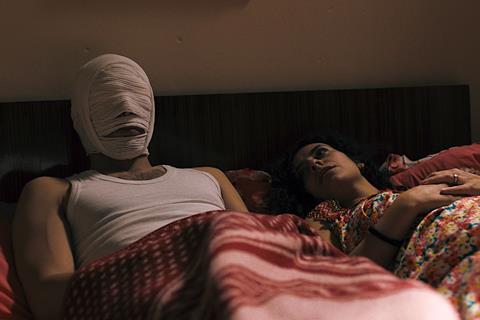Writer/director Yanis Koussim turns Algeria’s Black Decade into an effective possession narrative

Dir/scr: Yanis Koussim. France/Algeria/Qatar/Saudi Arabia. 2025. 89mins
In modern-day Algeria an ageing Muslim priest struggles with Alzheimer’s, to the increasing concern of his faithful disciple. In the early 1990s, another man is left with amnesia following a car crash, and returns home to find everything disturbingly off-kilter. Through these two interlinking stories, debut filmmaker Yanis Koussim effectively explores issues of memory, faith and violence, filtering the enduring horrors of civil war – specifically Algeria’s Black Decade (1992-2002) – through an enigmatic genre lens.
A disquieting soundscape amps up the growing sense of unease
Premiering in Venice Critics Week, it’s the first feature from Algerian filmmaker Koussim, who has previously made shorts such as My Brother (2010), which won awards at festivals including Locarno. He is also the founder of Plateau19, a collective of independent Algerian filmmakers, and now joins a cohort of interesting new Algerian talent including Damien Ounouri and Chakib Taleb-Bendiab. Roqia seems destined for further festival play and could well attract interest from an arthouse distributor or streamer.
Roqia begins with an on-screen Hadith from Islamic tradition: ‘Satan flows through man as blood flows through his veins.’ Blood will be a key leitmotif of the film, both literally – there are some gory moments – and figuratively, as a symbol of the essence of what connects us, and what so easily can be corrupted. A short, sharp 90s-set opening segment provides a disorienting cacophony of darkness, demonic voices, soldiers and hooded men; there is a massacre, much blood is shed. This interplay of faith and brutality will become the film’s dramatic impetus.
Part one, ‘The Exorcist’, then moves the action forward to modern-day Algeria. An elderly Muslim exorcist, known as a Raqi (played by Mostefa Djadjam), seems to be losing his touch; his unnamed disciple (an excellent Akram Djeghim) is concerned that his Alzheimer’s is beginning to weaken his connection to God – their only real defence, he believes, against the encroaching darkness. Their young, pregnant neighbour Wafaa (Hanaa Mansour) tries to help as much as she can; with her military husband away, she is also grateful for the company.
For the second storyline, we are back in the early 1990s with family man and former soldier Ahmed (Ali Namous), who we meet as he returns home after an accident, his face fully bandaged. (It will stay wrapped for a while, turning Ahmed into something of a faceless everyman.) While his wife Selma (Lydia Hanni) is pleased to see him, his youngest son is terrified of his father’s appearance. Ahmed has lost his memory, and his sense of displacement is worsened by disturbing nightly visitors who whisper in a strange language. As former soldier Ahmed learns more about the man he was – controlling, aggressive, hard-line – he becomes increasingly reluctant to regain his memories.
That Koussim’s screenplay never directly references the Algerian civil war, which raged from 1992 to 2002, makes Roqia all the more powerful a study of it. A conflict between the country’s government and various Islamist rebel groups, the war saw Algerian terrorists turning on their countrymen and resulted in hundreds of thousands of casualties. While Koussim grew up in Setif, a city that was largely spared the worst of the violence, the event cast a shadow across his consciousness – and the entire country.
That idea is reflected in cinematographer Jean-Marie Delorme’s atmospheric visuals, which contrast the simple warmth of Ahmed’s home with the shadows that move in the night, whispering to Ahmed in a strange tongue. Namous’s restrained, vulnerable performances suggests that something monumental has happened to Ahmed, even if he can’t remember – the suggestion is that if he lets the memories back in, he will be entirely lost.
This is an Islamic exorcism story of sorts. but aside from some well-handled moments, and a disquieting soundscape which amps up the growing sense of unease, the supernatural horror is understated. Roqia is more about the attempted possession of an entire faith, the ongoing war between religion and fundamentalism. Men are not born with evil, Koussim theorises, but are infected with it; that’s a resonant, universal message.
Production company: Supernova Films
International sales: Alpha Violet, Virginie Devesa virginie@alphaviolet.com
Producer: Fares Ladjimi
Cinematography: Jean-Marie Delorme
Production design: Saad Ouled Bachir
Editing: Sarah Zaanoun, Maxime Pozzi-Garcia
Main cast: Mostefa Djadjam, Akram Djeghim, Ali Namous, Lydia Hanni























